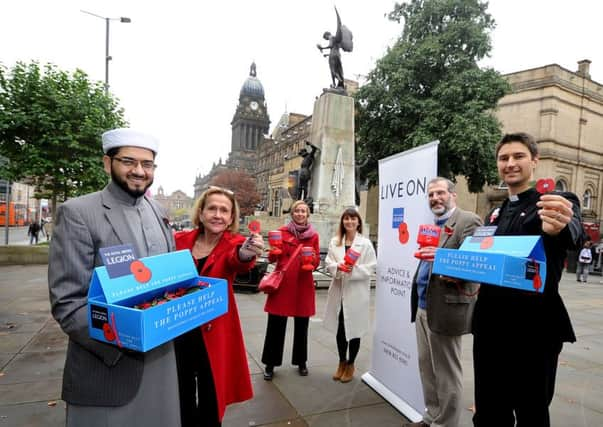Faith leaders unite to show how Remembrance can help unite


This small act is indicative of some of the core themes each man’s faith contains, kindness and humanity, something that has brought them together as they join the Royal British Legion to sell remembrance poppies.
The faith leaders, Iman Qari Asim of Leeds Makkah mosque, Rabbi Ian Morris of Sinai Synagogue, Roundhay and Rev Heston Groenwald of All Hallows Church, united as new research suggests that remembering those who gave their lives for Britain in the past can promote social cohesion today.
Advertisement
Hide AdAdvertisement
Hide AdPolling for think tank British Futures found 72 per cent of people think Remembrance Day brings people of all faiths and ethnicities together.
More than half of people from ethnic minorities say they will wear a poppy this November.
Dr Asim MBE said: “Remembering how Muslims, Jews and Christians stood side-by-side to defend Britain in both World Wars reminds us of the shared history and British identity that is common to us all.
“We hear too much about what divides Britain’s different communities and not enough about the values we share that bring us together.”
Advertisement
Hide AdAdvertisement
Hide AdRev Groenwold said: “At Remembrance time, we mark that the idea that the greatest love you can show is to give your life for someone else. We are all human, regardless of our faith.”
British Futures, backed by business secretary Sajid Javid, has launched a new campaign to highlight the contribution of the 400,000 Muslim soldiers who fought for Britain in as part of the 1.5 million-strong army of pre-partition India in World War One.
The poll found that only 22 per cent of people know about this contribution and only 2 per cent are aware of its scale.
Tonight, 100 trainee British army officers gather this evening at Sandhurst to hear about the contribution of Muslim soldiers.
Advertisement
Hide AdAdvertisement
Hide AdSaturday marks the anniversary of the first Victoria Cross for gallantry being awarded to a Muslim soldier, Khudadad Khan, a machine-gunner fighting on the Western Front in 1914 who, while seriously injured and under heavy fire, held off the enemy long enough for reinforcements to arrive. His portrait hangs in the India Room at Sandhurst.
Avaes Mohammad, of British Future, said telling the “unknown and untold” story of Muslim soldiers can help young British Muslims and other minorities understand their long connection with the country.
He added: “Understanding our past can help shape the present and our shared future.”